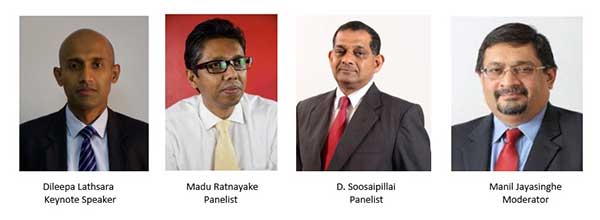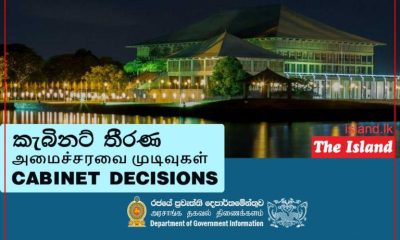Business
Webinar on ‘Security of Information Assets: What the Board Needs to Know’

The Sri Lanka Institute of Directors (SLID) together with EY organized a webinar, moderated by Manil Jayasinghe-Partner, EY on “Security of Information Assets: What the Board Needs to Know” recently to update the knowledge and understanding of Board members on the increasing cyber security risks and threats to information assets of an organization brought about by the rapid wave of digitalization and resulting changes in the way organizations work in response to the on-going pandemic.
The webinar also discussed strategies and best practices on how best to mitigate these risks in securing information assets while ensuring business continuity, loss minimization and quick, safe recovery in the event of a breach. The keynote address was delivered by Dileepa Lathsara-CEO, TechCert and the panel comprised of eminent tech and business leaders Madu Ratnayake-Executive Vice President, CIO/GM Virtusa and D. Soosaipillai-INED of Listed Companies.
“It is important to define what information assets are so that security can be provided to those assets. Contrary to the misconception that information assets are only the application systems or the systems where staff work on and the data that resides on those systems, information assets include supporting infrastructure such as switches, patch panels, routers, servers and all other equipment, and application systems including confidential corporate information in those systems. It is also important to identify where corporate information is stored and who has access to it” said Dileepa Lathsara-CEO, TechCert.
“Boards should get involved in handling cyber security risk by firstly setting a security tone for the organization so that everyone takes security seriously and also ensure that the required resources are made available. Boards can focus on the actual requirements of information security by adopting and adhering to security frameworks, standards, acts and directives such as NIST and ISO27000 series, PCI-DSS rather than having the IT security team re-invent the wheel” he added.
He further stated that cyber security should be incorporated into the digital transformation chain and should not be a mere afterthought to be plugged in at the end. Cyber accountability is also important in that it is the organization’s ability to demonstrate that they have good cyber hygiene to ensure, in case of an eventual attack, the ability to track back to a unique event/person or group responsible with admissible evidence which also aids in quick rectification and recovery. Dileepa also emphasized that it is important to make informed and optimal investments in cyber security mitigation which can be calculated preferably as Annualized Loss Expectancy (ALE) as against ROI since security is about loss prevention and not about earnings where ALE is calculated as the cost of a security incident x chance that the incident will occur in a year.
Panelist Madu Ratnayake said that it is essential and fundamental to have the right people in the security team led by a CISO (Chief Information Security Officer) and that cyber security is a journey and not a destination as security is evolving. The Boards should comprise of members who have expertise on security given that most companies are going digital and the risk becomes crucial.
Panelist D. Soosaipillai said that the first thing is to find a security standard to be adopted in the organization without which there will be limitless spending on security without knowing what the benefits are. The organization should have a security vertical such as a CISO or IT Security, which is where the Boards will look at to establish ownership for IT security. He also suggested that Board does regular, if not half yearly Vulnerability Assessment and Penetration Testing (VAPT) by external 3rd parties into the systems/security matrix of the organization.
Business
Code of Ethics for capital market influencers in the pipeline

The Securities and Exchange Commission (SEC) of Sri Lanka is planning to introduce a Code of Ethics or a set of guidelines for the activities of capital market influencers to protect the public from ongoing scams involving the swindling money from potential investors in the share market.
“The market regulator has already identified Blue Ocean Securities Limited and Gladius South Asia as involved in such scams, which are being investigated by the relevant authorities, said Deputy Director General of the SEC Tushara Jayaratne.
The Deputy Director General also said that Gladius was using their their logo in a fraudulent manner to promote their business as well.
He said Blue Ocean has been involved in asking investors to start trading through an app named BOMate Nd. ‘Through this app, you can’t trade shares. But the money transaction goes through this app and the SEC system does not see these transactions, Jayaratne explained.
“The money is going somewhere else, Jayaratne told journalists at a media briefing yesterday held at the SEC auditorium, WTC building, Colombo.
Jayaratne said the SEC has already made complaints to both the Criminal Investigation Department (CID) of the police and the Financial Intelligence Unit (FIU) of the Central Bank.
The Deputy Director General said the second company, Gladius South Asia, has been involved in asking investors not to invest their money in the local stock market, but to do so in the markets in foreign countries.
He also said that the SEC has adopted 12 key capital market development projects to increase the number of capital market investors.
“The Introduction of a Code of Ethics and guidelines for registered investment advisers will help to develop the market in an efficient and effective way, he said.
Jayaratne, however, said that the Sri Lankan share market is not full of scams and that people can have confidence in the market.
“Our market is somewhat free and fair. From the perspective of investors, you also have a responsibility to be careful when investing in the market, he added.
By Hiran H Senewiratne
Business
Norway supports flood-affected communities in Sri Lanka

Norway is providing more than USD 2.4 million to assist those affected by severe flooding in Sri Lanka.
“Norway is contributing emergency assistance to people who have lost both their homes and livelihoods in Sri Lanka. A rapid response is crucial to ensure that those affected have shelter, food, healthcare and support to rebuild their communities,” said Norway’s Minister of International Development, Åsmund Aukrust.
The United Nations estimates that nearly 11 million people have been impacted by catastrophic floods and landslides across large parts of South and Southeast Asia. Sri Lanka, Indonesia, Thailand, Vietnam and Malaysia have experienced record rainfall since 17 November. In total, approximately 1,600 people have lost their lives, and 1.2 million have been forced to leave their homes. Critical infrastructure such as houses and roads has been destroyed, and health risks are increasing due to waterborne diseases and poor sanitation.
“Norway is now contributing NOK 20 million (approx. USD 2 million) to the Red Cross Movement and the UN system in Sri Lanka. These organisations have presence in the country and the capacity to respond quickly based on local needs,” Aukrust said.
Sri Lanka is among the hardest-hit countries. On 28 November, Cyclone Ditwah struck the country, bringing heavy rain and strong winds. The cyclone triggered landslides and caused the most severe floodsing in recent history. The Sri Lankan authorities have led the search and rescue operations and allocated significant resources for immediate relief. “When disasters of this magnitude occur, it is vital that the international community and countries like Norway step up and support local actors in managing the crisis,” Aukrust said.
In addition, the UN Central Emergency Response Fund (CERF) has allocated USD 4.5 million for flood response in Sri Lanka. Around one in ten dollars in the fund comes from Norway.
Norway is also assisting flood-affected communities in Sri Lanka through an immediate response mechanism in the World Food Programme (WFP). The International Labour Organization (ILO) has re-allocated around USD 100,000 in a Norway-funded job generation project, to assist flood-affected participants. Furthermore, Norway has funded a UN expert to help coordinate ongoing relief efforts in the affected areas.
Business
Janashakthi Finance appoints Sithambaram Sri Ganendran as CEO

Janashakthi Finance PLC, formerly known as Orient Finance PLC and a subsidiary of JXG (Janashakthi Group), announces the appointment of Sithambaram Sri Ganendran as the Chief Executive Officer.
Sri Ganendran, who has held the position of Chief Operating Officer since September 2024, stepped in as Acting Chief Executive Officer during the past four months.
He brings with him almost 27 years of extensive experience in banking. Throughout his extensive career, he has held senior management roles in multiple local and international banks, where he acquired in-depth knowledge in operations, branch banking (across retail and SME sectors), operational risk, business continuity management, business integration, process reengineering, operational excellence, sales governance and credit card operations. He holds a plethora of qualifications including an MBA from American City University. He is a Fellow of the Chartered Institute of Management Accountants (CIMA) in the United Kingdom, and an Associate Member of the Chartered Institute of Securities and Investments (CISI), and a member of the Association of Professional Bankers of Sri Lanka.
Rajendra Theagarajah, Chairman of Janashakthi Finance PLC, said, “We are delighted to welcome Sithambaram Sri Ganendran to this important leadership role at a pivotal moment in our journey. His wealth of experience, proven track record, and people-focused leadership style make him well suited to strengthen and guide Janashakthi Finance, ensuring efficient continuity in all ongoing operations.”
The appointment of Sri Ganendran as Chief Executive Officer, reinforces Janashakthi Finance’s deep commitment to seamless operations and growth. It also underscores its dedication to vision of delivering trusted financial solutions, while continuously exploring opportunities for innovation and expansion to serve its customers and communities more efficiently.
-

 Business7 days ago
Business7 days agoCabinet approves establishment of two 50 MW wind power stations in Mullikulum, Mannar region
-

 Features4 days ago
Features4 days agoWhy Sri Lanka Still Has No Doppler Radar – and Who Should Be Held Accountable
-

 Features6 days ago
Features6 days agoDitwah: A Country Tested, A People United
-

 News6 days ago
News6 days agoRs 1. 3 bn yahapalana building deal under investigation
-

 News7 days ago
News7 days agoCabinet approves the transfer of the constructions and land reserved for the Kiinniya University to the Ministry of Foreign Affairs, Foreign Employment, and Tourism
-

 News6 days ago
News6 days agoFormer SAARC SG Esala Weerakoon calls for ‘South Asian Climate Compact’
-

 Business6 days ago
Business6 days agoFluctuating fortunes for bourse in the wake of selling pressure
-

 Opinion6 days ago
Opinion6 days agoComfort for some, death for others: The reality of climate change













